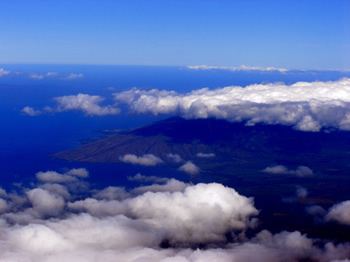 Kula: now I know why they call it that - it's Kula than anywhere else. It's the Canada of Maui. With nothing but the wild north of 10,000-foot Haleakala rising above it, and those hardy souls who don't mind cold at night and clouds all day to settle its backwoods, it puts me in fleece and felt slippers as I snack on passion fruit, lemon and plum, mango, coconut, yogurt. When I drive up to that summit above the clouds and hike into the barren crater under the hot sun, I'm greeted by the tame birds called Nene, a long-lost tribe of Canada geese.
Kula: now I know why they call it that - it's Kula than anywhere else. It's the Canada of Maui. With nothing but the wild north of 10,000-foot Haleakala rising above it, and those hardy souls who don't mind cold at night and clouds all day to settle its backwoods, it puts me in fleece and felt slippers as I snack on passion fruit, lemon and plum, mango, coconut, yogurt. When I drive up to that summit above the clouds and hike into the barren crater under the hot sun, I'm greeted by the tame birds called Nene, a long-lost tribe of Canada geese.
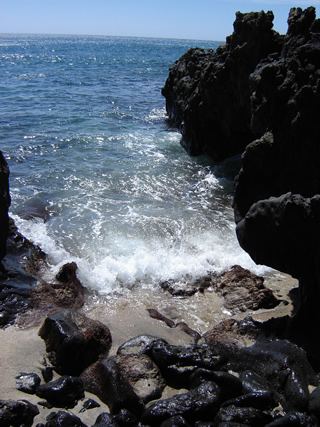
At least I'm within 30 minutes of the real thing, the West African dance class with full traditional drum ensemble. After Oahu's tame FireTribe over the weekend, I was ready to taste this magic again and still it caught me by surprise. Now, I thought, I'm home. New friends opened up, the road home became mellower, and I savored the warm evening air of upper Haiku. On the one hand, I could live here. On the other, what I keep hearing is that people come and go. Kind of a lifestyle thing, in tune with wide ocean breezes, always new. In the heart of the ocean, beating with its pulse ...
Maui is a Mother, like the plant medicines many grow and use here - a nuturing, forgiving spirit. "Come and be healed," she says, with soothing breezes, heartstrong sun, wholly waves. I suppose it's no accident that I'm drawn to nest here and take warmth from the slopes of a volcano, the very body of Pele.
In mid-October here in what's called the "cloud forest," I turn to hot baths in the evening, retreating to my cave of a bedroom with the propane heater, and contemplate cutting more wood in the mornings for the living room fireplace, and those rainy cold winter days everyone's warning me about.
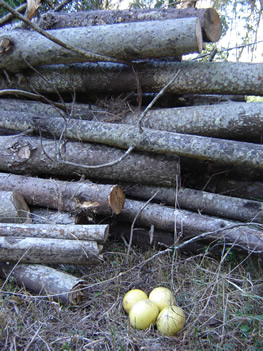 On the other hand, I can do cold. I lived in the arctic for three years, even; doing as the Inuit do, and just dressing warm (except of course for those teens who liked to run around in jeans and T-shirts at thirty below). I got in eight cords of wood for winter in the drafty old Beguin house in Argenta, BC, then lived in a tipi three winters while building my house. Am I just getting old and soft now, bending to the tropic persuasion so lazily, that at times I'm even swinging to the extreme of "never wanting to be cold again"?
On the other hand, I can do cold. I lived in the arctic for three years, even; doing as the Inuit do, and just dressing warm (except of course for those teens who liked to run around in jeans and T-shirts at thirty below). I got in eight cords of wood for winter in the drafty old Beguin house in Argenta, BC, then lived in a tipi three winters while building my house. Am I just getting old and soft now, bending to the tropic persuasion so lazily, that at times I'm even swinging to the extreme of "never wanting to be cold again"?
Maybe's it's the infantile urge to get back to Mommy - no, earlier: to inside Mommy's womb, fully enclosed by body temperature 24/7. Safety, security ... the ease to breathe, as through an invisible umbilical cord, and to move without effort, languidly through water, over soft sand and among swaying palms. It's a persuasive advertising message, at that. Witness the resort component of Maui's demographic triad, resort-rural-wild. The rural and the wild have the root effect fueling the resort set, for that matter, for these are the real thing: living in Maui time. They also provide the source of marketed concepts, like the aloha spirit.
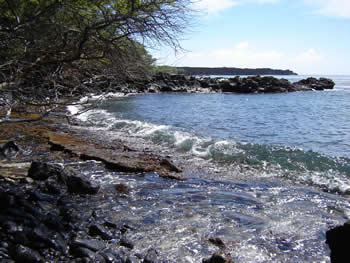 | 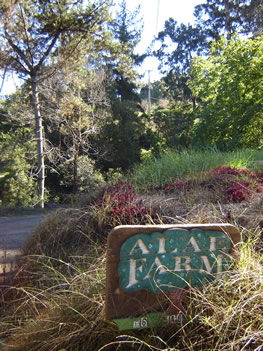 |
The English writers (Somerset Maugham, Graham Greene, even BCer Malcolm Lowry) observed it, and succumbed to it, when in the garb of the colonialist. The lassitude of the easy life. Not that the colonial era has passed, mind you. Here I am in my hill station as in the India of the Raj, playing my civilized games of music and literature while the native masses seethe below ...
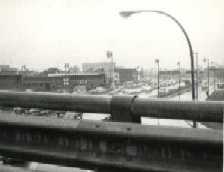 So is it indulgent to press on with this quest for eternal warmth? It's only natural, I might say, as I'm joined by that punctual pair of orange cats each morning in the hot rising sunshine. Or are the tabbies not natural at all, but just more accessories in the colonial trappings; like all the invasive species here? Maybe human beings, of whatever race or origin, are an invasive species ...
So is it indulgent to press on with this quest for eternal warmth? It's only natural, I might say, as I'm joined by that punctual pair of orange cats each morning in the hot rising sunshine. Or are the tabbies not natural at all, but just more accessories in the colonial trappings; like all the invasive species here? Maybe human beings, of whatever race or origin, are an invasive species ...
Back to the subject: neither hot nor cold. Actually I don't mind hot: I prefer it. But I think that it's just a compensation for cold. If I were always warm, I don't think I'd need to seek more heat. As it is, there's this oscillation effect, so that for every hour I spend dealing with temperatures, say, of 15/59 degrees, I need to compensate with an hour at 25/77 degrees, to balance out as a room-temperature average warmth of 20/68 degrees. When I lived in Quebec, the summer/winter temperatures in Montreal and Quebec City ranged from plus 40 to minus 40. But the midpoint of 0 (freezing) is not my idea of moderation.
For me it probably goes back to that time of birth, when I came out of the womb a month premature: maybe I'm still trying to recapture that lost month of comfort. So while we're at it, let's adjust the thermostat. Because actually my preferred midrange might be 25, with a comfortable range of 20 to 30 degrees centigrade. That would fit my definition, at least, of "never being cold."
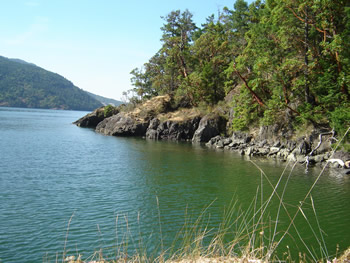 It was the root motivation behind that item on my previous "5-Year Plan" that called for "Living in the tropics (or equivalent) for a full year." I did kind of do that two years ago when I traveled in South Asia and the Pacific for six months, next to a "summer" in Victoria, BC. Trouble is, that was quite a hedge considering that true summer (temperatures consistently above 20, and warm-water lake and selected ocean swimming) in Victoria typically lasts only two months at best; sometimes just one. Last summer was exceptional and, after a full winter spent through the gray, cool, misty days, I swam in my favorite ocean spot, almost comfortably, from the end of May through the end of August.
It was the root motivation behind that item on my previous "5-Year Plan" that called for "Living in the tropics (or equivalent) for a full year." I did kind of do that two years ago when I traveled in South Asia and the Pacific for six months, next to a "summer" in Victoria, BC. Trouble is, that was quite a hedge considering that true summer (temperatures consistently above 20, and warm-water lake and selected ocean swimming) in Victoria typically lasts only two months at best; sometimes just one. Last summer was exceptional and, after a full winter spent through the gray, cool, misty days, I swam in my favorite ocean spot, almost comfortably, from the end of May through the end of August.
Now I'm already starting to hesitate when I enter the ocean here. "I think Thailand was warmer than this. I'm sure it was warmer than this in southern India, and the ocean off Guinea as well ..."
But here at least they speak English. They even speak, in a rather watered-down polyglot way, American. You still hear New Jersey or Boston, Atlanta or Dallas, but also a lot of generic California and Colorado, Oregon and Arizona. The roads are mostly smooth highways, the ATMs work, and there's shopping and fast food and drink aplenty. Infrastructure and finance all familiar, the empire intact in one of its more benign outposts ... But now I'm drifting off topic again.
I'm getting drowsy already, and it's only 10:40. Was it the hot bath, or is it the oxygen in this room with the windows closed being burned up by the propane stove and replaced by carbon dioxide or worse, which by the way also adds to my carbon debt along with all the gas I burn in that American national pet the automobile to carry me to my sweaty drum-dance workouts and my yuppiistic sunbathing on the distant beaches.
Experiment: open the window ...
Ah, a little warmer than I expected - yet still cool ... like a summer evening in BC. Funny, on those warmest of summer evenings in Victoria, I always remark, "... just like Hawaii." Somewhere in the middle of the two, is that elusive ideal.
The middle way: between hot and cold. Too hot all the time wouldn't work either: sweltering, shut down, debilitating. You at least have to find shade. Or as I did in Baltimore as a kid in the summer, retreat to the basement.
 Earth-sheltered house I built in Argenta: to moderate the extremes of hot and cold. Passive solar heating of rock walls and floors, to save excess heat from the sun and release it later in the cooler night. Rock hot tub next to the wood stove, to hold its heat and save it for a melting soak on a winter's day, and ease it back into the room constantly. Sunbathing is like that: storing in the skin the warming rays, to feel later as a slow burn, nightglow ...
Earth-sheltered house I built in Argenta: to moderate the extremes of hot and cold. Passive solar heating of rock walls and floors, to save excess heat from the sun and release it later in the cooler night. Rock hot tub next to the wood stove, to hold its heat and save it for a melting soak on a winter's day, and ease it back into the room constantly. Sunbathing is like that: storing in the skin the warming rays, to feel later as a slow burn, nightglow ...
I had a conversation with Larry tonight about my church of Bembe experience on Tuesday at Zephyr's place, wavering back and forth in my feeling of the short bell part, and in general that knife-edge between 6/8 and 3/4, where the ideal is neutral in between, so the listener can have the subjective magical experience of hearing it one way or the other, instead of handing it to them my way but continually changing my mind, or like driving a car, Larry says, weaving back and forth from one side of the road to the other, or just letting that playful spirit carry me away with it instead of remaining firm and straight and consistent on the part, keeping it in the middle, remaining neutral.
Like my conversation with Eugene before that, about sharing life's vicissitudes, the good and the bad, equally, among friends. We can accept whatever it is, from our friend.
And the book by Cope, The Wisdom of Yoga, going deeper into that same universal question, of the nature of the mind, the brain, to respond and evaluate and react according to the simplistic label "attraction" or "aversion," on a continual basis processing input of senses and thoughts. Instead, the process can be subject to a witnessing awareness, so that at least the chain of reaction can be broken, and subtler still, the chain of habitual evaluation.
 So, true, I can choose not to bemoan my state if I am cold, adding suffering to the experience of cold itself. Or I can choose to do something about it: like, taking a bath, lighting the propane stove, keeping the windows shut, wearing a long-sleeved shirt, going to bed soon, staying in bed till the sun comes up, carrying and cutting firewood by hand to get warmed up before it even burns, and, whenever possible, going to the beach. I did, after all, move to Maui, so it's all here somewhere, 24/7, if I want it.
So, true, I can choose not to bemoan my state if I am cold, adding suffering to the experience of cold itself. Or I can choose to do something about it: like, taking a bath, lighting the propane stove, keeping the windows shut, wearing a long-sleeved shirt, going to bed soon, staying in bed till the sun comes up, carrying and cutting firewood by hand to get warmed up before it even burns, and, whenever possible, going to the beach. I did, after all, move to Maui, so it's all here somewhere, 24/7, if I want it.
Check that:See, even if I had that vision - that moving to Kihei, say, or even more radically, ditching Hawaii for Thailand or India or Africa, would solve the problem of ever being cold again - there are a couple of big problems. First of all, that restrictive vision is kind of anti-warm, which is to say stressful if there's pressure to maintain it. Suppose I live down near the beach in Kihei, for instance. Then what do I do, how do I feel, if I get invited to a jam at Mick Fleetwood's right here on Alae Road in Kula, some rainy January night? Even in Danya's jungle in Huelo on my last visit in January, I compared it to June in Victoria: or as we call it there, "Junuary." Coldest winter in 12 years, they told me, but it happened just the same. What do I do, cry, flee, complain, write a manifesto?
The middle way isn't just a range on the thermometer. Even if I achieved perfect temperature control in my environment, what about all the other aspects of that environment that I also evaluate as important but variable, with certain strong preferences and needs to consider? There are a multitude of manifestoes that end up having to compete in the personal boardroom for decision-making clout. Who's the CEO around here anyway? Oh, he couldn't make it this time. He's taking an extended vacation on Maui ...

Then there's the quantum connection: the middle way between particle and wave. The experiment says that if you're looking for a particle, that's what you see. If you're looking for a wave, that's what you see. Elemental reality is both, at the same time; but we can't see both at the same time, only one or the other. So my quest, on this more elemental level, is to neutralize the swings between hot and cold, between desire and aversion, and find the equanimity of the warmth between.
There is a further twist, though. The above ideal is just that: a perfectionist's ideal. Real life, living in the world in human form, puts us on the see-saw, the roller coaster of the this grand amusement park. Fitted with the instrumentation at hand, we see first particle, then wave; the bliss and conflict of relationship; the thrill of victory and the agony of defeat in the realm of competitive sports (or business); the arctic and tropic realms of earthly experience. Heaven and Hell lie within the range of daily human experience.
Is even the impulse to moderate the extremes, then, well-meaning as it is in the interest of healthy balance, at odds with the nature of life? Maybe; but it's all open to choice. The wilder the swings, the greater the ecstasies of desire and the sufferings of disappointment. Get high if you want, but be ready for the hangover.
![]()
The true middle path of constant equanimity is another choice: the life of the yogi, the celibate, the monk or saint. And this doesn't necessarily mean renunciation of the world. It can mean bringing a neutralizing influence of attention to bear during every step, every breath, in the midst of whatever our engagement with the world is. We can choose the range we live in, which is not dependent on our economic status or even our personal conditioning, but on our inner freedom in responding to impulses, desires, aversions, and judgments. We can take on the degree of involvement, in the worldly see-saw of emotion, that makes sense for us; and this degree itself can change, in a larger wave of our path of growth and experience. At one time, celibacy; at another, delving into relationship again. From Arctic, to Tropic, and back to the Temperate zone again, for another while.
At the top of Haleakala, realm of the fire-goddess, Pele, I'm challenged by the altitude, recalling Nepal; and by the exertion of a full-day hike, recalling my expedition to the top of Mt. Cooper. That pointed cone of ice presents the opposite image of my destination here, a so-called "bottomless pit" (Kawilinau) where lava once spewed forth, now closed off at a depth of 65 feet. This mountain is a breast of the goddess rising out of the sea - or a mere nipple on the wide oceanic bosom - from which, from time to time, her milky fire flows.
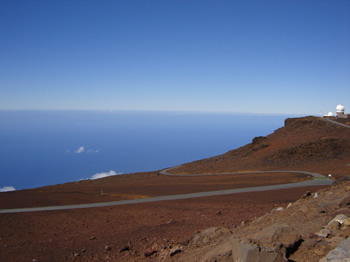 | 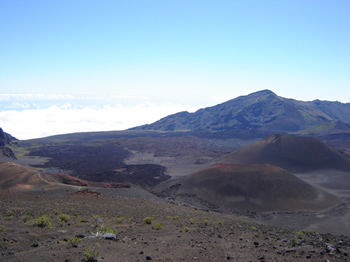 |
 On the plane to Honolulu I sat next to a guy who had just sold his top-100 dot-com business, and so I wound up picking his brain on keys to success: the right domain name, key paying partnerships, reverse engineering Google from competing sites. All this I knew already; the difference was, he actually followed through and did the grunt work to make it happen.
On the plane to Honolulu I sat next to a guy who had just sold his top-100 dot-com business, and so I wound up picking his brain on keys to success: the right domain name, key paying partnerships, reverse engineering Google from competing sites. All this I knew already; the difference was, he actually followed through and did the grunt work to make it happen.
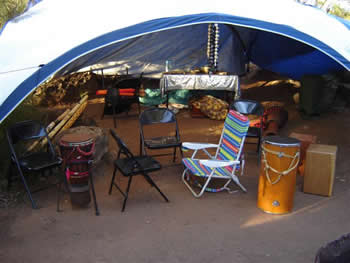
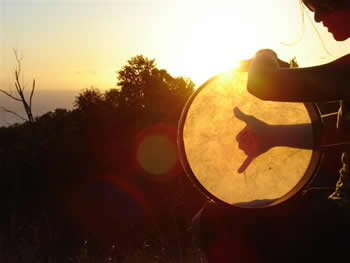 There was a small gathering at the camp site, a Christian-run place where I'd been once before, at Winter Solstice 2002. Partly as a result of the low numbers, and partly as an ongoing intention of these gatherings to de-emphasize the heavy drums and open more space for light percussion, frame drums, singing and chanting, the energy of this circle on the first night was low-key. A few more people showed up on the second night so there was more dance energy, and one drummer in particular just wanted to keep pounding it out ... until he was told quietly to give it a rest. Ukulele, harmonium came in to fill the gap. Coffee with coconut milk was delivered to musicians in the wee hours. Still, on the first night I didn't make it all the way through, but only till around 4.
There was a small gathering at the camp site, a Christian-run place where I'd been once before, at Winter Solstice 2002. Partly as a result of the low numbers, and partly as an ongoing intention of these gatherings to de-emphasize the heavy drums and open more space for light percussion, frame drums, singing and chanting, the energy of this circle on the first night was low-key. A few more people showed up on the second night so there was more dance energy, and one drummer in particular just wanted to keep pounding it out ... until he was told quietly to give it a rest. Ukulele, harmonium came in to fill the gap. Coffee with coconut milk was delivered to musicians in the wee hours. Still, on the first night I didn't make it all the way through, but only till around 4.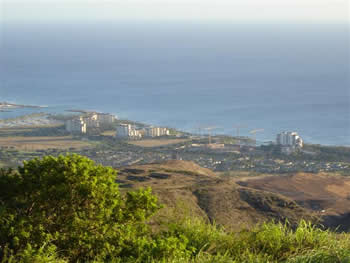 I dreamed I was in love with another man's woman. This is the reminder of what
I dreamed I was in love with another man's woman. This is the reminder of what 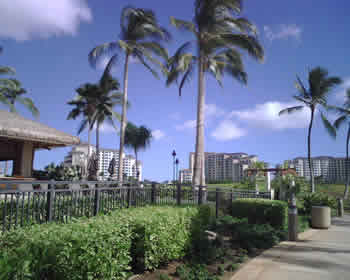
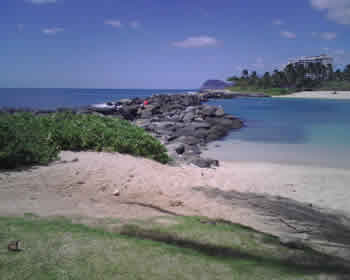
 - In a big black pickup truck, a young Hawaiian woman rides on the passenger side, with a bright flower (plastic?) in her hair over her ear.
- In a big black pickup truck, a young Hawaiian woman rides on the passenger side, with a bright flower (plastic?) in her hair over her ear.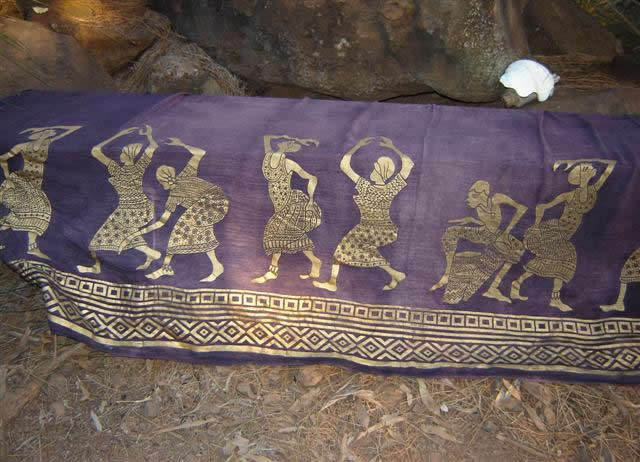
 Funny how the professional life and the personal life overlap. Now back working steadily as a
Funny how the professional life and the personal life overlap. Now back working steadily as a 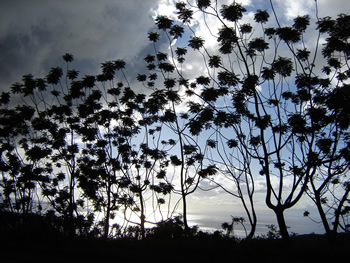
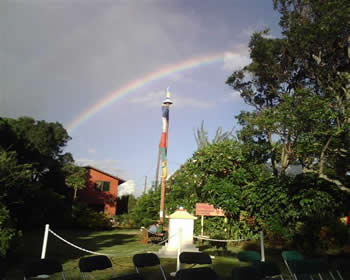 Back on the ranch of the mundane ... I have been mostly preoccupied over the last three weeks with getting set up in my new household, with the help of my host Marianna, who was still here for two weeks of that time busily preparing for her own winter journeys. She's an artist of some renown who paints
Back on the ranch of the mundane ... I have been mostly preoccupied over the last three weeks with getting set up in my new household, with the help of my host Marianna, who was still here for two weeks of that time busily preparing for her own winter journeys. She's an artist of some renown who paints 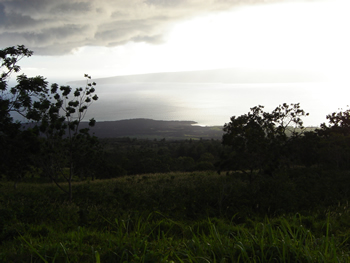
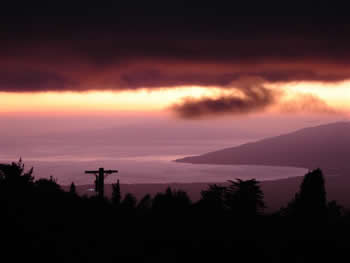 The fact is, there's beautiful warm sun here for a couple of hours first thing in the morning. Then clouds form from the ocean breezes on the mountain and hang over it like a sombrero for the rest of the day. Around mid-afternoon the sun clears the canopy and shines back in from the west, ending in a glorious unique sunset each day. The nights and mornings are chilly, the days moderate. "Winter," I hear, is somewhat more challenging, but it's all relative. This is Hawaii, after all.
The fact is, there's beautiful warm sun here for a couple of hours first thing in the morning. Then clouds form from the ocean breezes on the mountain and hang over it like a sombrero for the rest of the day. Around mid-afternoon the sun clears the canopy and shines back in from the west, ending in a glorious unique sunset each day. The nights and mornings are chilly, the days moderate. "Winter," I hear, is somewhat more challenging, but it's all relative. This is Hawaii, after all. The other throwback to my days in rural BC is a garden - my first in 15 years. This one has been just too easy. Three raised beds behind the house were nicely rototilled in advance of my arrival. I bought a flat of starter seedlings and plunked them in the ground in less than an hour. The trick now is to wait. In the meantime, groceries. The tree crops here have been a disappointment. I heard macadamias, avocados, various fruits ... in reality the only things bearing now are plums and some tiny dry tangerines. So, once again the ideal needs modification:
The other throwback to my days in rural BC is a garden - my first in 15 years. This one has been just too easy. Three raised beds behind the house were nicely rototilled in advance of my arrival. I bought a flat of starter seedlings and plunked them in the ground in less than an hour. The trick now is to wait. In the meantime, groceries. The tree crops here have been a disappointment. I heard macadamias, avocados, various fruits ... in reality the only things bearing now are plums and some tiny dry tangerines. So, once again the ideal needs modification: 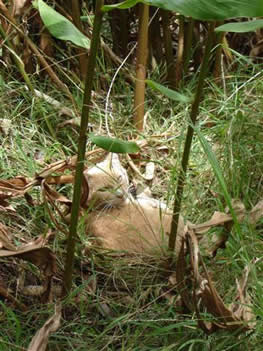
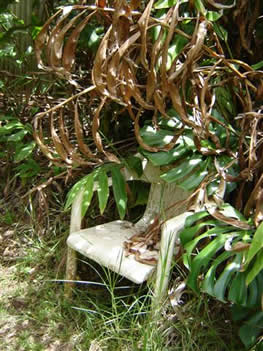



 It all came down to Saturday when, on very little sleep following intensive Internet research and spreadsheet comparisons of local ads, I set out to make the rounds of my top candidates. First on the list was a '96 Mazda Protege with only 97,000 miles and an asking price of $1500 obo. It happened that the car sat off a little road in Huelo, Ulalena, that I recognized as the road to
It all came down to Saturday when, on very little sleep following intensive Internet research and spreadsheet comparisons of local ads, I set out to make the rounds of my top candidates. First on the list was a '96 Mazda Protege with only 97,000 miles and an asking price of $1500 obo. It happened that the car sat off a little road in Huelo, Ulalena, that I recognized as the road to 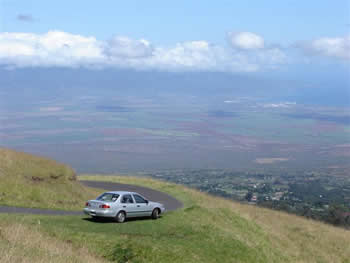

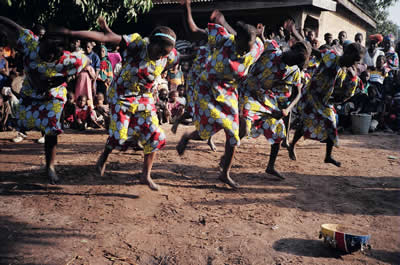 What does a
What does a 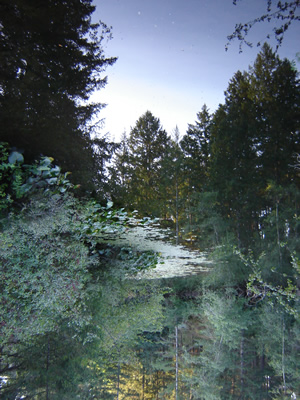 In the moment, I am satisfied with my cheese-and-beet sandwich, brought to this lakeside in a handy plastic container, with a jar of green tea, computer to write with,
In the moment, I am satisfied with my cheese-and-beet sandwich, brought to this lakeside in a handy plastic container, with a jar of green tea, computer to write with, 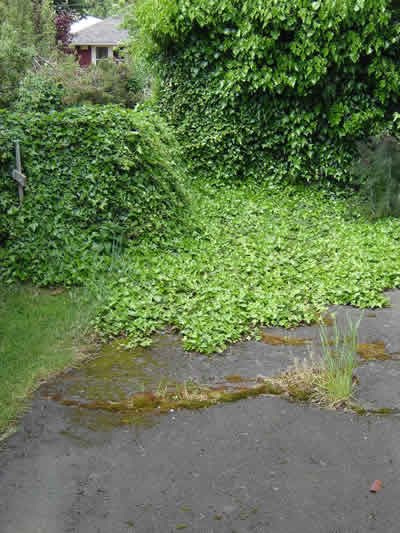


 If video doesn't appear,
If video doesn't appear, 







